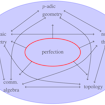Simons Foundation Announces the Simons Collaboration on New Frontiers in Superconductivity
The Simons Foundation is pleased to announce the establishment of the Simons Collaboration on New Frontiers in Superconductivity, directed by B. Andrei Bernevig of Princeton University. This collaboration will be funded by the Simons Foundation International and administered by the Simons Foundation.

Superconductivity (SC) is a remarkable quantum phenomenon first observed in 1911 by Kamerlingh Onnes. It is characterized by the ability to carry electric current without resistance and to expel magnetic fields, which has significant technological implications. Over the past century, SC has greatly influenced condensed matter physics and other fields, such as particle physics and quantum technology. The conventional Bardeen-Cooper-Schrieffer (BCS) theory of SC, which attributes it to weak attractive interactions between low-energy fermions, was initially sufficient to explain the phenomenon. However, the discovery of high-temperature superconductors and SC in unconventional systems such as cuprates, Fe-based materials and two-dimensional van der Waals materials challenged this theory. These discoveries suggest that SC can arise from strong coupling interactions and non-Fermi liquid states, necessitating a new theoretical framework beyond the BCS paradigm.
At this crucial juncture, there is an urgent need for a collaborative research effort to develop a comprehensive theory of SC that accounts for these new observations. This collaboration aims to understand SC in systems with strong coupling, multiple valley and orbital degrees of freedom, and quantum geometric and topological influences. By integrating advanced numerical methods such as machine learning and AI with these new theoretical insights, the collaboration seeks to predict and discover new superconducting materials with higher critical temperatures and novel properties. Achieving these goals could lead to groundbreaking advancements in technology, including energy-efficient computing and low-dissipation supercurrents, potentially revolutionizing various fields and significantly impacting society.


